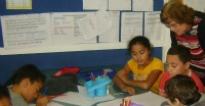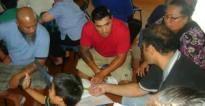Mangere East students can’t get enough of “Bobbie” maths

Have you ever heard of “Bobbie” maths? This is what the children – and some teachers and parents – call the cooperative approach to mathematics learning at Mangere East, a decile 1 school with 500 students. The school community has turned inside out how they “do” maths in order to better meet the needs of their predominantly Pasifika learners.
The work is led by researcher and academic, Dr Bobbie Hunter, a New Zealand-born Cook Islander. She worked with three Auckland primary schools (the other two are Koru and East Tamaki) to replicate an exemplar from Quality Teaching for Diverse (All) Learners in Schooling: Best Evidence Synthesis (2003).
BES exemplars for quality teaching - Education Counts website
Developing communities of mathematical inquiry - Education Counts website
Maths problems have Pasifika contexts
“What we're doing here is very different from how they were doing maths before at the school,” says Bobbie. “This approach is about focusing on how maths problems, expressed in words, can be made to fit the world of the children. Problems are centred around a Pasifika context, or a problem local to the school.”
Team leader Trevor Bills gives an example, “We might look at how many bananas you need to make a batch of a couple of hundred panikeke or how many lollies it takes to make up a lolly lei.” He says he has really noticed the positive way that children are now responding to maths. “Last week I did some block testing so they were doing more set work. They kept asking me when they could get back to Bobbie maths!”
Principal Anthony Noble-Campbell and the school’s lead teachers are very enthusiastic about the greater engagement in maths learning that they have seen over two terms: “For a long time we have had large numbers of students not achieving through the traditional methods of learning. Even though we’ve had very experienced teachers we’ve been unable to make big gains, so we had been thinking about other approaches that could give us the results we were looking for.
The opportunity Bobbie offered us to be involved in this pilot came along at the right time and reinforced the school-wide professional development we had undertaken that focused on Spencer Kagan’s approach to co-operative learning structures.”
“Bobbie’s advice was to break away from having fixed groups,” says Trevor. “This made us anxious and seemed daunting because it went against years and years of setting up maths groups with specific routines. But now we're into it I would say to other schools, allow your teachers just to have a go. It sounds like chaos and confusion – but it’s not. As long as you’ve got the rules around learning conversations and how to do it, it’s very liberating and very empowering for both teachers and children.”
Working cooperatively and collaboratively
“Bobbie” maths teachers work with flexible groups including half the class of mixed ability. Bobbie and teachers at the school say that working cooperatively in small groups builds on the collaborative way Pasifika peoples like to work.
“Students ask one another for information, evaluate one another’s ideas and monitor each other’s work,” says Anthony. “Our teacher role has changed from giving information to facilitating students' learning. In Kagan’s approach to learning, like the Pasifika approach to learning, everyone succeeds when the group succeeds. This fits with the principles that underpin our vertical team-teaching structures especially Ako and tuakana-teina. Ako encourages our teachers to build caring and inclusive learning environments where everyone (teachers, students and fanau) feels that their contribution is valued. The tuakana–teina relationship provides another model of learning where we can learn from each other irrespective of our titles or levels of expertise. One day I might be seen as the expert, and the next I am the learner.”
Since the start of 2013, many children have jumped in maths achievement. Bobbie puts this down to the collaborative structures, and teachers making maths problems real, engaging and solvable. “We want the children to engage with particular mathematical practices, some of which are quite sophisticated like reasoning and then justification.”
“A spin off is that reading levels have improved because students are reading and using more oral language in maths. They use both English and Samoan,” says deputy principal, Adele Darwen, “and this greatly assists their learning.”
Another key element of the maths programme, the leadership team says, is its integration with the Key Competencies. The initiative strengthens students’ ability to think critically, establish effective relationships with others, become actively involved in their own learning and make effective contributions as group members.
Teacher professional learning
The joint in-depth professional learning sessions that Bobbie has run with the leaders and teachers at all three schools have been crucial in helping them make shifts in their maths teaching practice. “Teachers have formed a community of learners, and students have formed communities of mathematical inquiry in their classrooms. Every single person in Mangere East has been involved in the professional learning including the principal and DPs. I’ve even been working in classrooms where the ESOL teacher and a social worker was involved – it's a whole school take on it. Instead of one teacher and 30 children – we have 31 people learning.”
“Bobbie sets up the teachers’ sessions as a kind of exploration time,” says Anthony. “We sit and play with the maths equipment and use the rules of cooperative learning and use cooperative language – so we are learning in the same environment as the children. One of the biggest changes for us has been strengthening teachers’ curriculum knowledge around mathematical thinking.”
Anthony says that apart from being involved in Bobbie’s sessions he’s been able to put strategic resourcing in place so that teachers could be released to observe each other. He says there has been a wider value too, “I saw this as an opportunity to give something back to the profession – I expect that key teachers who are now leading this programme will be open to teachers from other schools coming into their classrooms to learn from them so that we strengthen not only ourselves but other school communities.”
Involving fanau

Strong community engagement has been an important factor. Says Anthony, “Fanau engagement has always been variable here. But when Bobbie offered to do a community meeting around understanding the approaches to maths we’re doing here, we got the children to write an invitation to their parents. We were blown away – our hall was filled with parents! They sat with their children and our teachers and were engaged in maths problem solving for over an hour … at the end of the meeting the parents wanted more.”
Anthony puts the success of the initiative down to it being a Pasifika initiative that keys into core Pasifika values about sharing and family, “This is about their world.”
Reflective questions
These reflective questions might guide you in your reading of this story:
- With your senior teachers consider the key factors that help students to engage with learning. To what degree do your classroom programmes and practices encompass the worlds of the students, especially Māori and Pasifika?
- Which groups are likely to respond to the kinds of collaborative learning processes that are described? How might these be set up in your school?
- What roles can school leaders play in helping teachers to engage in professional learning that brings about student enagagment and enthusiasm that supports improvement (such as that generated by “Bobbie” maths)?
- The work at Mangere East is based on one of the exemplars to emerge from the Quality Teaching for Diverse (All) Learners in Schooling: Best Evidence Synthesis. How might the BES exemplars support the development of teaching and learning at your school?
References
Alton-Lee, A. (2003). Quality teaching for diverse students in schooling:Best evidence synthesis. Ministry of Education. Wellington.
Tags: Culturally responsive leadership, Curriculum, Pasifika student achievement, Student engagement
